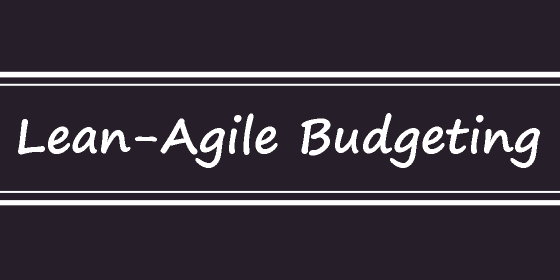Lean-Agile Budgeting

Lean-Agile Budgeting is an approach to budget management that aligns with Lean and Agile principles, enabling organizations to fund and manage their initiatives in a more flexible, adaptive, and value-driven manner. It moves away from traditional annual budgeting practices that may be inflexible and rigid and instead embraces a more incremental and value-based approach.
Key aspects of Lean-Agile Budgeting include:
- Incremental Funding: Lean-Agile Budgeting supports incremental funding, allowing initiatives and projects to be funded in smaller increments based on their progress and demonstrated value delivery.
- Value-Based Funding: The approach prioritizes funding initiatives based on their expected value to the organization and its strategic goals. High-value initiatives are given priority over others.
- Rolling Wave Planning: Lean-Agile Budgeting employs rolling wave planning, where high-level budgets and plans are set for a shorter period (e.g., quarterly), and more detailed plans are created as the time frame approaches.
- Beyond Fixed Timeframes: It moves away from the fixed timeframes of annual budgets and instead focuses on adapting budget allocations based on changing priorities and business conditions.
- Lean Portfolio Management: Lean-Agile Budgeting is often coupled with Lean Portfolio Management, where investment decisions are continuously reviewed and adjusted based on evolving business needs.
- Lean Budgeting Practices: Lean principles, such as reducing waste and optimizing flow, are applied to budgeting practices to increase efficiency and value delivery.
- Responsibility and Accountability: Lean-Agile Budgeting encourages financial responsibility and accountability at all levels of the organization, including teams, departments, and portfolios.
- Flexibility in Resource Allocation: The approach allows for reallocation of resources to high-priority initiatives as needed, fostering adaptability and responsiveness to changing market conditions.
- Regular Budget Reviews: Regular budget reviews are conducted to assess the performance of initiatives and ensure alignment with strategic objectives.
- Lean Business Case: Lean-Agile Budgeting often involves creating lean business cases that emphasize validated learning, experimentation, and iterative value delivery.
Lean-Agile Budgeting is particularly beneficial for organizations adopting Agile and Lean practices at scale. By adopting a value-driven approach to budget management, organizations can optimize their resource allocation, increase adaptability, and ensure that funding decisions are aligned with strategic priorities. It enables organizations to continuously assess the performance of initiatives and make informed decisions based on real-time data and insights, leading to more effective and efficient use of financial resources.